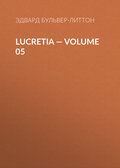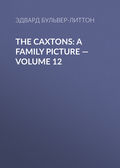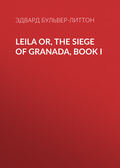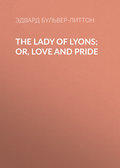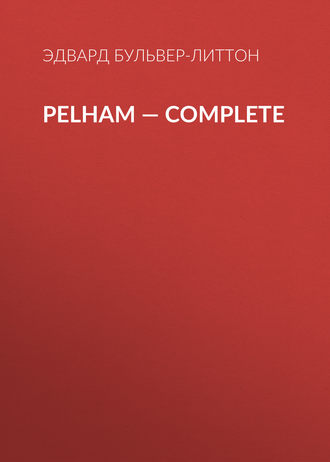
Эдвард Бульвер-Литтон
Pelham — Complete
CHAPTER XXXVII
Political education is like the keystone to the arch
—the strength of the whole depends upon it.
—Encycl. Britt. Sup. Art. "Education."
I was sitting in the library of Glenmorris Castle, about a week after all the bustle of contest and the eclat of victory had began to subside, and quietly dallying with the dry toast, which constituted then, and does to this day, my ordinary breakfast, when I was accosted by the following speech from my uncle.
“Henry, your success has opened to you a new career: I trust you intend to pursue it?”
“Certainly,” was my answer.
“But you know, my dear Henry, that though you have great talents, which, I confess, I was surprised in the course of the election to discover, yet they want that careful cultivation, which, in order to shine in the House of Commons, they must receive. Entre nous, Henry; a litle reading would do you no harm.”
“Very well,” said I, “suppose I begin with Walter Scott’s novels; I am told they are extremely entertaining.”
“True,” answered my uncle, “but they don’t contain the most accurate notions of history, or the soundest principles of political philosophy in the world. What did you think of doing to-day, Henry?”
“Nothing!” said I very innocently.
“I should conceive that to be an usual answer of yours, Henry, to any similar question.”
“I think it is,” replied I, with great naivete.
“Well, then, let us have the breakfast things taken away, and do something this morning.”
“Willingly,” said I, ringing the bell.
The table was cleared, and my uncle began his examination. Little, poor man, had he thought, from my usual bearing and the character of my education, that in general literature there were few subjects on which I was not to the full as well read as himself. I enjoyed his surprise, when little by little he began to discover the extent of my information, but I was mortified to find it was only surprise, not delight.
“You have,” said he, “a considerable store of learning; far more than I could possibly have imagined you possessed; but it is knowledge not learning, in which I wish you to be skilled. I would rather, in order to gift you with the former, that you were more destitute of the latter. The object of education, is to instil principles which are hereafter to guide and instruct us; facts are only desirable, so far as they illustrate those principles; principles ought therefore to precede facts! What then can we think of a system which reverses this evident order, overloads the memory with facts, and those of the most doubtful description, while it leaves us entirely in the dark with regard to the principles which could alone render this heterogeneous mass of any advantage or avail? Learning without knowledge, is but a bundle of prejudices; a lumber of inert matter set before the threshold of the understanding to the exclusion of common sense. Pause for a moment, and recal those of your contemporaries, who are generally considered well-informed; tell me if their information has made them a whit the wiser; if not, it is only sanctified ignorance. Tell me if names with them are not a sanction for opinion; quotations, the representatives of axioms? All they have learned only serves as an excuse for all they are ignorant of. In one month, I will engage that you shall have a juster and deeper insight into wisdom, than they have been all their lives acquiring; the great error of education is to fill the mind first with antiquated authors, and then to try the principles of the present day by the authorities and maxims of the past. We will pursue for our plan, the exact reverse of the ordinary method. We will learn the doctrines of the day, as the first and most necessary step, and we will then glance over those which have passed away, as researches rather curious than useful.
“You see this very small pamphlet; it is a paper by Mr. Mills, upon Government. We will know this thoroughly, and when we have done so, we may rest assured that we have a far more accurate information upon the head and front of all political knowledge, than two-thirds of the young men whose cultivation of mind you have usually heard panegyrized.”
So saying, my uncle opened the pamphlet. He pointed out to me its close and mathematical reasoning, in which no flaw could be detected, nor deduction controverted: and he filled up, as we proceeded, from the science of his own clear and enlarged mind, the various parts which the political logician had left for reflection to complete. My uncle had this great virtue of an expositor, that he never over-explained; he never made a parade of his lecture, nor confused what was simple by unnecessary comment.
When we broke off our first day’s employment, I was quite astonished at the new light which had gleamed upon me. I felt like Sinbad, the sailor, when, in wandering through the cavern in which he had been buried alive, he caught the first glimpse of the bright day. Naturally eager in every thing I undertook, fond of application, and addicted to reflect over the various bearings of any object that once engrossed my attention, I made great advance in my new pursuit. After my uncle had brought me to be thoroughly conversant with certain and definite principles, we proceeded to illustrate them from fact. For instance, when we had finished the “Essay upon Government,” we examined into the several constitutions of England, British America, and France; the three countries which pretend the most to excellence in their government: and we were enabled to perceive and judge the defects and merits of each, because we had, previous to our examination, established certain rules, by which they were to be investigated and tried. Here my sceptical indifference to facts was my chief reason for readily admitting knowledge. I had no prejudices to contend with; no obscure notions gleaned from the past; no popular maxims cherished as truths. Every thing was placed before me as before a wholly impartial inquirer—freed from all the decorations and delusions of sects and parties, every argument was stated with logical precision—every opinion referred to a logical test. Hence, in a very short time, I owned the justice of my uncle’s assurance, as to the comparative concentration of knowledge. We went over the whole of Mills’s admirable articles in the encyclopaedia, over the more popular works of Bentham, and thence we plunged into the recesses of political economy. I know not why this study has been termed uninteresting. No sooner had I entered upon its consideration, than I could scarcely tear myself from it. Never from that moment to this have I ceased to pay it the most constant attention, not so much as a study as an amusement; but at that time my uncle’s object was not to make me a profound political economist. “I wish,” said he, “merely to give you an acquaintance with the principles of the science; not that you may be entitled to boast of knowledge, but that you may be enabled to avoid ignorance; not that you may discover truth, but that you may detect error. Of all sciences, political economy is contained in the fewest books, and yet is the most difficult to master; because all its higher branches require earnestness of reflection, proportioned to the scantiness of reading. Mrs. Marsett’s elementary work, together with some conversational enlargement on the several topics she treats of, will be enough for our present purpose. I wish, then, to show you, how inseparably allied is the great science of public policy with that of private morality. And this, Henry, is the grandest object of all. Now to our present study.”
Well, gentle Reader, (I love, by the by, as you already perceive, that old-fashioned courtesy of addressing you)—well, to finish this part of my life which, as it treats rather of my attempts at reformation than my success in error, must begin to weary you exceedingly, I acquired, more from my uncle’s conversation than the books we read, a sufficient acquaintance with the elements of knowledge, to satisfy myself, and to please my instructor. And I must say, in justification of my studies and my tutor, that I derived one benefit from them which has continued with me to this hour—viz. I obtained a clear knowledge of moral principle. Before that time, the little ability I possessed only led me into acts, which, I fear, most benevolent Reader, thou hast already sufficiently condemned: my good feelings—for I was not naturally bad—never availed me the least when present temptation came into my way. I had no guide but passion; no rule but the impulse of the moment. What else could have been the result of my education? If I was immoral, it was because I was never taught morality. Nothing, perhaps, is less innate than virtue. I own that the lessons of my uncle did not work miracles—that, living in the world, I have not separated myself from its errors and its follies: the vortex was too strong—the atmosphere too contagious; but I have at least avoided the crimes into which my temper would most likely have driven me. I ceased to look upon the world as a game one was to play fairly, if possible—but where a little cheating was readily allowed; I no longer divorced the interests of other men from my own: if I endeavoured to blind them, it was neither by unlawful means, nor for a purely selfish end:—if—but come, Henry Pelham, thou hast praised thyself enough for the present; and, after all, thy future adventures will best tell if thou art really amended.
CHAPTER XXXVIII
Mihi jam non regia Roma,
Sed vacuum Tibur placet.
—Horace.
“My dear child,” said my mother to me, affectionately, “you must be very much bored here, pour dire vrai, I am so myself. Your uncle is a very good man, but he does not make his house pleasant; and I have, lately, been very much afraid that he should convert you into a mere bookworm; after all, my dear Henry, you are quite clever enough to trust to your own ability. Your great geniuses never read.”
“True, my dear mother,” said I, with a most unequivocal yawn, and depositing on the table Mr. Bentham upon Popular Fallacies; “true, and I am quite of your opinion. Did you see in the Post of this morning, how full Cheltenham was?”
“Yes, Henry; and now you mention it, I don’t think you could do better than to go there for a month or two. As for me, I must return to your father, whom I left at Lord H—‘s: a place, entre nous, very little more amusing than this—but then one does get one’s ecarte table, and that dear Lady Roseville, your old acquaintance, is staying there.”
“Well,” said I, musingly, “suppose we take our departure the beginning of next week?—our way will be the same as far as London, and the plea of attending you will be a good excuse to my uncle, for proceeding no farther in these confounded books.”
“C’est une affaire finie,” replied my mother, “and I will speak to your uncle myself.”
Accordingly the necessary disclosure of our intentions was made. Lord Glenmorris received it with proper indifference, so far as my mother was concerned; but expressed much pain at my leaving him so soon. However, when he found I was not so much gratified as honoured by his wishes for my longer sejour, he gave up the point with a delicacy that enchanted me.
The morning of our departure arrived. Carriage at the door—bandboxes in the passage—breakfast on the table—myself in my great coat—my uncle in his great chair. “My dear boy,” said he, “I trust we shall meet again soon: you have abilities that may make you capable of effecting much good to your fellow-creatures; but you are fond of the world, and, though not averse to application, devoted to pleasure, and likely to pervert the gifts you possess. At all events, you have now learned, both as a public character and a private individual, the difference between good and evil. Make but this distinction, that whereas, in political science, though the rules you have learned be fixed and unerring, yet the application of them must vary with time and circumstance. We must bend, temporize, and frequently withdraw, doctrines, which, invariable in their truth, the prejudices of the time will not invariably allow, and even relinquish a faint hope of obtaining a great good, for the certainty of obtaining a lesser; yet in the science of private morals, which relate for the main part to ourselves individually, we have no right to deviate one single iota from the rule of our conduct. Neither time nor circumstance must cause us to modify or to change. Integrity knows no variation; honesty no shadow of turning. We must pursue the same course—stern and uncompromising—in the full persuasion that the path of right is like the bridge from earth to heaven, in the Mahometan creed—if we swerve but a single hair’s breadth, we are irrevocably lost.”
At this moment my mother joined us, with a “Well, my dear Henry, every thing is ready—we have no time to lose.”
My uncle rose, pressed my hand, and left in it a pocket-book, which I afterwards discovered to be most satisfactorily furnished. We took an edifying and affectionate farewell of each other, passed through the two rows of servants, drawn up in martial array, along the great hall, entered the carriage, and went off with the rapidity of a novel upon “fashionable life.”
CHAPTER XXXIX
Dic—si grave non est—
Quae prima iratum ventrem placaverit esca.
—Horace.
I did not remain above a day or two in town. I had never seen much of the humours of a watering-place, and my love of observing character made me exceedingly impatient for that pleasure. Accordingly, the first bright morning I set off for Cheltenham. I was greatly struck with the entrance to that town: it is to these watering-places that a foreigner should be taken, in order to give him an adequate idea of the magnificent opulence, and universal luxury, of England. Our country has, in every province, what France only has in Paris—a capital, consecrated to gaiety, idleness, and enjoyment. London is both too busy in one class of society, and too pompous in another, to please a foreigner, who has not excellent recommendations to private circles. But at Brighton, Cheltenham, Hastings, Bath, he may, as at Paris, find all the gaieties of society without knowing a single individual.
My carriage stopped at the—Hotel. A corpulent and stately waiter, with gold buckles to a pair of very tight pantaloons, showed me up stairs. I found myself in a tolerable room facing the street, and garnished with two pictures of rocks and rivers, with a comely flight of crows, hovering in the horizon of both, as natural as possible, only they were a little larger than the trees. Over the chimney-piece, where I had fondly hoped to find a looking-glass, was a grave print of General Washington, with one hand stuck out like the spout of a tea-pot. Between the two windows (unfavourable position!) was an oblong mirror, to which I immediately hastened, and had the pleasure of seeing my complexion catch the colour of the curtains that overhung the glass on each side, and exhibit the pleasing rurality of a pale green.
I shrunk back aghast, turned, and beheld the waiter. Had I seen myself in a glass delicately shaded by rose-hued curtains, I should gently and smilingly have said, “Have the goodness to bring me the bill of fare.” As it was, I growled out, “Bring me the bill, and be d—d to you.”
The stiff waiter bowed solemnly, and withdrew slowly. I looked round the room once more, and discovered the additional adornments of a tea-urn, and a book. “Thank Heaven,” thought I, as I took up the latter, “it can’t be one of Jeremy Bentham’s.” No! it was the Cheltenham Guide. I turned to the head of amusements—“Dress ball at the rooms every—” some day or other—which of the seven I utterly forget; but it was the same as that which witnessed my first arrival in the small drawing-room of the—Hotel.
“Thank Heaven!” said I to myself, as Bedos entered with my things, and was ordered immediately to have all in preparation for “the dressball at the rooms,” at the hour of half-past ten. The waiter entered with the bill. “Soups, chops, cutlets, steaks, roast joints, birds.”
“Get some soup,” said I, “a slice or two of lion, and half a dozen birds.”
“Sir,” said the solemn waiter, “you can’t have less than a whole lion, and we have only two birds in the house.”
“Pray,” asked I, “are you in the habit of supplying your larder from Exeter ‘Change, or do you breed lions here like poultry?”
“Sir,” answered the grim waiter, never relaxing into a smile, “we have lions brought us from the country every day.”
“What do you pay for them?” said I.
“About three and sixpence a-piece, Sir.”
“Humph!—market in Africa overstocked,” thought I.
“Pray, how do you dress an animal of that description?”
“Roast and stuff him, Sir, and serve him up with currant jelly.”
“What! like a hare?”
“It is a hare, Sir.”
“What!”
“Yes, Sir, it is a hare! [Note: I have since learned, that this custom of calling a hare a lion is not peculiar to Cheltenham. At that time I was utterly unacquainted with the regulations of the London coffee-houses.]—but we call it a lion, because of the Game Laws.”
‘Bright discovery,’ thought I; ‘they have a new language in Cheltenham: nothing’s like travelling to enlarge the mind.’ “And the birds,” said I, aloud, “are neither humming birds, nor ostriches, I suppose?”
“No, Sir; they are partridges.”
“Well, then, give me some soup; a cotelette de mouton, and a ‘bird,’ as you term it, and be quick about it.”
“It shall be done with dispatch,” answered the pompous attendant, and withdrew.
Is there, in the whole course of this pleasant and varying life, which young gentlemen and ladies write verses to prove same and sorrowful,—is there, in the whole course of it, one half-hour really and genuinely disagreeable?—if so, it is the half-hour before dinner at a strange inn. Nevertheless, by the help of philosophy and the window, I managed to endure it with great patience: and though I was famishing with hunger, I pretended the indifference of a sage, even when the dinner was at length announced. I coquetted a whole minute with my napkin, before I attempted the soup, and I helped myself to the potatory food with a slow dignity that must have perfectly won the heart of the solemn waiter. The soup was a little better than hot water, and the sharp sauced cotelette than leather and vinegar; howbeit, I attacked them with the vigour of an Irishman, and washed them down with a bottle of the worst liquor ever dignified with the venerabile nomen of claret. The bird was tough enough to have passed for an ostrich in miniature; and I felt its ghost hopping about the stomachic sepulchre to which I consigned it, the whole of that evening and a great portion of the next day, when a glass of curacoa laid it at rest.
After this splendid repast, I flung myself back on my chair with the complacency of a man who has dined well, and dozed away the time till the hour of dressing.
“Now,” thought I, as I placed myself before my glass, “shall I gently please, or sublimely astonish the ‘fashionables’ of Cheltenham? Ah, bah! the latter school is vulgar, Byron spoilt it. Don’t put out that chain, Bedos—I wear—the black coat, waistcoat, and trowsers. Brush my hair as much out of curl as you can, and give an air of graceful negligence to my tout ensemble.”
“Oui, Monsieur, je comprends,” answered Bedos.
I was soon dressed, for it is the design, not the execution, of all great undertakings which requires deliberation and delay. Action cannot be too prompt. A chair was called, and Henry Pelham was conveyed to the rooms.



